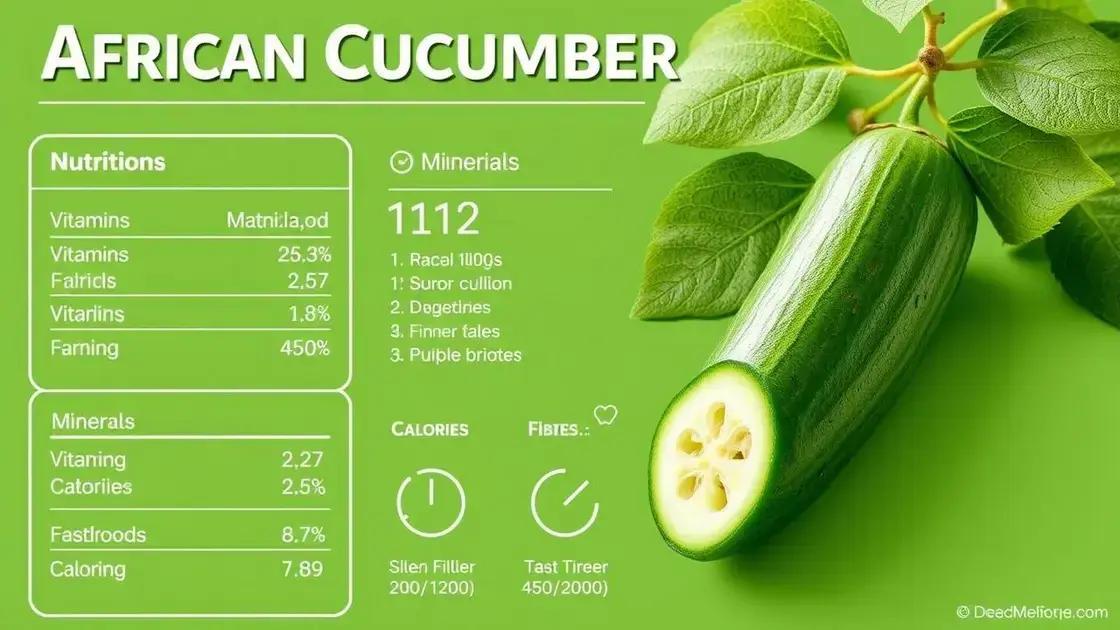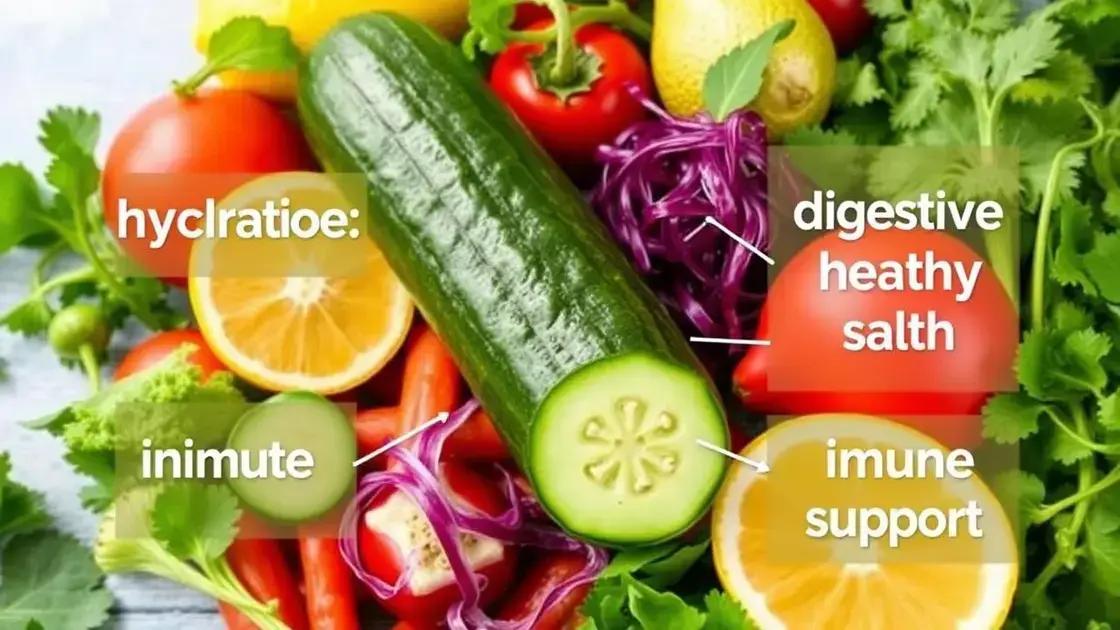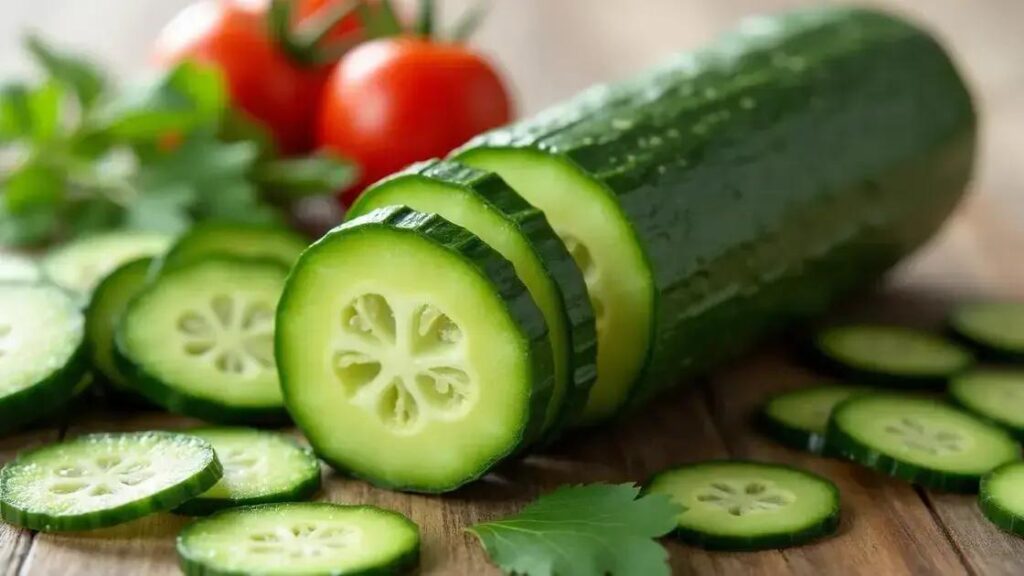African Cucumber, also known as Kiwano, is a unique fruit with spiky skin and gelatinous green flesh. It is low in calories, rich in Vitamin C and fiber, and offers various health benefits, including immune support and hydration. Deliciously versatile, it can be used in salads, smoothies, salsas, and more.
African Cucumber, also known as Kiwano, is a unique fruit that captivates many with its unusual appearance and extraordinary taste. Most people wonder, what is the composition of African Cucumber? This intriguing fruit boasts a variety of nutrients, making it not only delicious but also beneficial for health. In this article, we will explore its composition, including its impressive nutritional profile and how it can enhance your meals. Dive in to discover the secrets of this exotic fruit and learn how to incorporate it into your diet!
What is African Cucumber?

African Cucumber, also called Kiwano, is an extraordinary fruit native to Africa. This unique fruit is recognized for its spiky orange-yellow skin and bright green, jelly-like flesh. What is African Cucumber? It is part of the cucumber family and boasts a flavor profile that combines banana, lime, and cucumber tastes, making it a delightful addition to various dishes.
African Cucumber grows in warm climates and is cultivated in regions like South Africa, New Zealand, and Australia. The fruit is often used in salads, desserts, and beverages due to its refreshing taste. Its striking appearance and flavor have captured the interest of chefs and food enthusiasts worldwide.
Structure and Characteristics
The fruit is oval-shaped and typically averages 3 to 4 inches in length. The outer skin is vibrant and textured, with spikes giving it a distinctive look. Inside, the flesh contains numerous tiny seeds surrounded by a gelatinous substance. This unique composition contributes to its intriguing taste and mouthfeel.
Culinary Use
In culinary applications, African Cucumber can be eaten raw, added to smoothies, or used as a garnish. It can also be made into juice or incorporated into salsas for a refreshing twist. The fruit is low in calories, making it a guilt-free treat.
Nutritional Profile of African Cucumber

The nutritional profile of African Cucumber is impressive and makes it a valuable addition to a healthy diet. This fruit is low in calories, containing about 44 calories per 100 grams. It’s rich in essential vitamins and minerals, which contribute to its health benefits.
Vitamins and Minerals
African Cucumber is a good source of Vitamin C, providing approximately 30% of the recommended daily intake. Vitamin C is wonderful for boosting the immune system and promoting healthy skin. Additionally, it contains Vitamin A, which is important for vision and skin health.
Fiber Content
With its gelatinous flesh, African Cucumber is also a great source of dietary fiber. This fiber aids digestion and helps maintain a healthy gut. Eating fruits rich in fiber can contribute to weight management and support overall digestive health.
Antioxidants
This unique fruit is packed with antioxidants, which help protect the body against oxidative stress. Antioxidants combat free radicals, reducing the risk of chronic diseases and promoting overall well-being.
In summary, the nutritional profile of African Cucumber showcases why it’s an excellent choice for a nutritious snack. Its combination of vitamins, minerals, fiber, and antioxidants makes it a standout fruit in the world of healthy eating.
Health Benefits of African Cucumber

African Cucumber offers several health benefits that make it a valuable addition to any diet. This unique fruit is low in calories but high in vitamins, minerals, and antioxidants, contributing to overall health.
Immune System Support
Due to its rich Vitamin C content, African Cucumber helps boost the immune system. Vitamin C plays a crucial role in fighting infections, making it a great snack during the cold and flu season.
Hydration
With a high water content, African Cucumber is an excellent fruit for hydration. Staying hydrated is vital for maintaining energy levels and supporting various bodily functions.
Digestive Health
The fiber found in African Cucumber aids digestion and helps prevent constipation. Consuming fiber-rich foods is essential for a healthy digestive system and can support regular bowel movements.
Weight Management
African Cucumber is low in calories and high in water and fiber, making it a good snack for weight management. It can help you feel full without consuming many calories, making it easier to maintain a healthy weight.
Antioxidant Properties
The antioxidants present in African Cucumber help combat oxidative stress in the body. These compounds reduce inflammation and lower the risk of chronic diseases, promoting long-term health.
How to Use African Cucumber in Recipes

Using African Cucumber in recipes adds a unique flavor and texture to various dishes. Here are some delicious ways to incorporate this fruit into your meals:
Fresh Salads
One of the simplest ways to enjoy African Cucumber is in salads. Cut the fruit in half, scoop out the jelly-like flesh, and add it to a mix of greens, tomatoes, and your favorite dressing. The refreshing taste pairs well with citrus vinaigrette.
Smoothies
African Cucumber can add a delightful twist to your smoothies. Blend the jelly-like flesh with yogurt, spinach, a banana, and a splash of orange juice. This combination not only tastes great but also boosts your nutrient intake!
Salsas
Try using African Cucumber in salsas. Combine diced African Cucumber with tomatoes, onions, cilantro, and lime juice for a refreshing topping for grilled fish or chicken. This fruity salsa adds a unique texture and flavor to your dishes.
Garnishes
African Cucumber works fantastically as a garnish. Slice it thinly and use it to top tacos, poke bowls, or rice dishes. Its bright color and unique shape create an eye-catching presentation.
Hydrating Popsicles
For a fun, healthy treat, blend the flesh of African Cucumber with coconut water and your choice of sweetener. Pour the mixture into molds and freeze. Enjoy these refreshing popsicles on a hot day!
Discover the Wonders of African Cucumber
African Cucumber is not only a unique and exotic fruit, but it also offers numerous health benefits and versatile culinary uses. From boosting your immune system with its rich Vitamin C content to aiding digestion with its fiber, this fruit is a fantastic addition to any healthy diet.
Experimenting with African Cucumber in salads, smoothies, salsas, and more allows you to enhance your meals with refreshing flavors and textures. With its low calorie count and hydrating properties, it is perfect for anyone looking to maintain a balanced lifestyle.
By incorporating African Cucumber into your recipes, you can unlock its many secrets and enjoy the delightful taste and health benefits it has to offer.
FAQ – Frequently Asked Questions about African Cucumber
What is African Cucumber?
African Cucumber, also known as Kiwano, is a unique fruit characterized by its spiky orange-yellow skin and bright green gelatinous interior.
What are the nutritional benefits of African Cucumber?
African Cucumber is low in calories, high in Vitamin C, and a good source of dietary fiber and antioxidants, promoting overall health.
How can I use African Cucumber in recipes?
You can use African Cucumber in salads, smoothies, salsas, as a garnish, or even in refreshing popsicles.
What health benefits does African Cucumber provide?
African Cucumber supports the immune system, aids digestion, helps with hydration, is low in calories, and is packed with antioxidants.
Is African Cucumber easy to find in stores?
African Cucumber may not be available in all grocery stores but can often be found in specialty or international markets.
Can I eat African Cucumber seeds?
Yes, the seeds of African Cucumber are edible and are usually consumed along with the flesh of the fruit.













